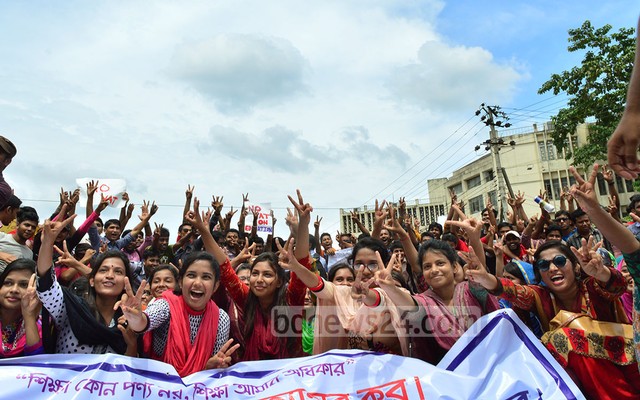Suddenly an innocuous sounding tax on private Universities had begun to look bigger than a problem of calculating 7.5% of tax and who pays it. Nobody bothered about it when introduced but once the students took to the streets and blocked a few roads, the issue went national.
In the end, the government in general and the Finance Ministry in particular have come out looking inept and it has been withdrawn. But the events have also shown how superficial the urban tranquility actually is, how easy it is to cause disruption and how to be noticed even without violence. A new group and strategy has emerged which, if it goes more political, will be an immense headache for everyone concerned.
The VAT controversy was caused by inefficiency. When the VAT was introduced, it was never made clear to anyone as to who was supposed to pay it and why it was being imposed on non-profit organisations.
Although the entire parliament voted it in, no questions were asked causing such enormous embarrassment for the government later. It’s not just GOB party members signing it in, but the bureaucrats giving poor briefings including to the PM, who defended the imposition in the parliament and later had to withdraw it.
Legally and otherwise, the government is on weak ground because private universities are non-profit organisations and VAT doesn’t apply to them, no matter how high the fees. A court case judgment was also mentioned by legal experts stating that unless they’re profit-making bodies, VAT doesn’t apply, no matter the size of the fees.
And no matter what, VAT is going to be paid by the consumer which in this case means the students, unless VAT rules are changed. This has nothing to do with the amount charged but what VAT applies to according to law.
The students managed to turn the protest into a powerful movement sans violence which is why the police after the first round of firing at the East West University went cautious. Since more students study at private universities and pay much more than what students pay to the public universities, any action could alienate a large section of the middle class whose children go there.
Children who study at the private universities are from the same class as those students who go to public universities. It seems that the officials thought that since private university students don’t protest publicly, they could afford to be careless.
But as the events have shown, inefficiency can carry a heavy price, even in a chronically inefficient country like ours.
The policy-makers are seriously out of touch with reality. Parents send their kids to get educated as a route to a job just like they do in the public universities. The difference is that, the fees are subsidised at public universities and parents pay the full fees in private Universities.
Entry is restricted to the better students at public universities. But as far as users are concerned, they both come from the same class. The rich and privileged don’t send their kids to private Universities, they send their kids abroad.
Public universities quite simply can’t cope with the demand of the aspiring middle class and that is why so many private universities have sprung up. Aspirations of the middle class will be met by education only and with the expansion of the middle class.
Either the government has to set up more subsidised public universities or build a partnership with the private sector to help do its task well. The approach of demonising private universities and subsidising existing public ones without opening new avenues looks like a very immature and losing proposition, an approach that has led to the political defeat of sorts in the face of student agitation.
But it’s also a question of access to privileges because only a minority section of students get a chance to study in public universities. As prices rise, the inevitable question will be if such an elitist approach can work in a society where the middle class wants to join the workforce but can’t get the chance to, as they are excluded for whatever reason.
The standard of education in many private universities is not high but when demand outstrips supply, this is inevitable. So unless the government can ensure education for those who want it and join the workforce including the government, problems will increase.
The government tried to portray private university students as a privileged group first, but failing to do so, tried to demonise the administration of private universities and failed.
Thus their obvious lack of understanding of the issue was clear. More parents have been affected by this decision than any political decision that has been taken recently.
The private universities controversy is not a trade union issue but a social one. It involves an entire class and not just a hired section of that class. This never- on- the- street group did shout slogans and walk with banners which were not political.
It has created a new power group, and if more privileges are sought by them including more entry into the civil service and right to open political party branches to become politicians, the most lucrative profession in the country, one should not be surprised.
For the moment, let’s not forget that the streets spoke and won, led by a rather unlikely bunch of novices. It won’t be the last time.
Source: bdnews24










